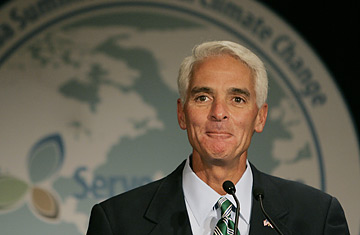
Florida Governor Charlie Crist at ServetoPrserve, a Florida Summit on Global Climate Change, Miami, Florida, July 12, 2007
This summer's record-breaking heat has put global warming at center stage — with the slew of Live Earth concerts and inescapable pontifications by Al Gore. Most Republicans, however, seem to be watching from the wings. But Florida's new G.O.P. Governor, Charlie Crist, hopes to erase that impression starting today with a major international summit in Miami on climate change, featuring California Governor Arnold Schwarzenegger and Robert Kennedy Jr.
"Traditionally, this is viewed as an issue Democrats champion, but if you go back to Republicans' roots, there's a strong conservationist bent," says Crist, who also invited Teddy Roosevelt's great-grandson as a keynote speaker to remind people that a Republican founded America's national parks system. "It's important to stand up for what you believe in, regardless of party affiliation."
Since taking office in January, Crist has enlisted the bellwether Sunshine State in the Schwarzenegger-led movement to pull the party back toward the center — and few issues highlight that determination more than global warming. At the summit's close, Crist — who plans to install solar panels at the Governor's mansion in Tallahassee next week — will sign an executive order making Florida the latest of a dozen states to adopt California's stringent standards for reducing greenhouse gas emissions. It requires 2009 model cars sold in Florida to cut those emissions by 25% and utilities to cut them to 1990 levels by 2025. "Look at Florida's enormous tourist industry — our economy is inextricably linked to our environment," Crist told TIME on the eve of the summit. "Imagine what rising sea levels [caused by global warming] would do to Florida. We have more coastline, almost 1,300 miles, than any state except Alaska. I happen to be a Republican, and I happen to be a Floridian, and this is something I feel strongly about."
The summit will host prominent scientists, business executives and government officials from around the world and focus on topics like emissions, forest conservation and alternative fuels. (Crist is also mandating that state-owned vehicles use biofuels like corn ethanol when possible.) But Crist, who made a point of inviting Kennedy, also hopes it will promote what he says is a sorely needed bipartisan approach on global warming, as well as provide a nudge to recalcitrant conservatives who still consider the global warming science murky or are simply opposed to the kind of measures states like California and now Florida are promulgating. The summit "should help America move forward on the issue," says Crist, "and it might encourage our friends at the federal level to do more."
That's a barely disguised dig at the Bush Administration. As soon as California, led by the moderate Republican Schwarzenegger, adopted its new emissions standards in 2004, the auto industry and other opponents filed suit insisting that such orders were the exclusive purview of the federal government. Since then, the Environmental Protection Agency (EPA) has barred California and the other states that have followed its example (including New York) from enforcing the new codes. The states have since petitioned for special waivers — Crist says Florida will join that effort — something the EPA is supposed to rule on this fall.
Crist nonetheless points out that President Bush in recent months has said "some very positive things" about acknowledging climate change. "I sense and see some modification" in Bush's outlook, says Crist, which he hopes will be furthered by events like his global warming summit, which could help bolster Republican chances in electoral vote-rich Florida. "Like a good offensive line pushing down the field," says Crist, a former college football player, "eventually you knock down the door and you build consensus."
Just as much a wild card, however, are Floridians themselves. They are environmentally conscious on issues like Everglades preservation and offshore oil drilling. Even Crist's conservative predecessor, Jeb Bush, the President's younger brother, championed the former and opposed the latter. Still, the car is king in Florida to a greater degree than it is even in California; and the peninsula is scattered with dead initiatives to curb its use, especially local tax efforts to improve the state's virtually nonexistent public transportation. But Crist, whose optimism is as bright as his tan, isn't worried. "Floridians love their cars, and that's their right," he says. "But I think there may be less of a fight here than we might imagine. There is a consensus of opinion and a desire among Floridians to do this."
So far, anyway, Crist's reading of Floridians has been accurate on most issues: his approval rating is flying around 70%, and he's won kudos for reinstilling a bipartisan spirit into the state's traditionally centrist politics. What's more, the summit adds to the state's feeling that it's become a national agenda-setter, especially after Crist and the legislature recently moved Florida's presidential primary to the front of the pack by scheduling it in January. Presidential candidates "are crawling all over the state now," Crist says. They're listening harder, he adds, to Florida-sensitive issues like a national catastrophe fund for disasters like hurricanes. And now, he hopes, they'll put Florida at center stage on global warming.
